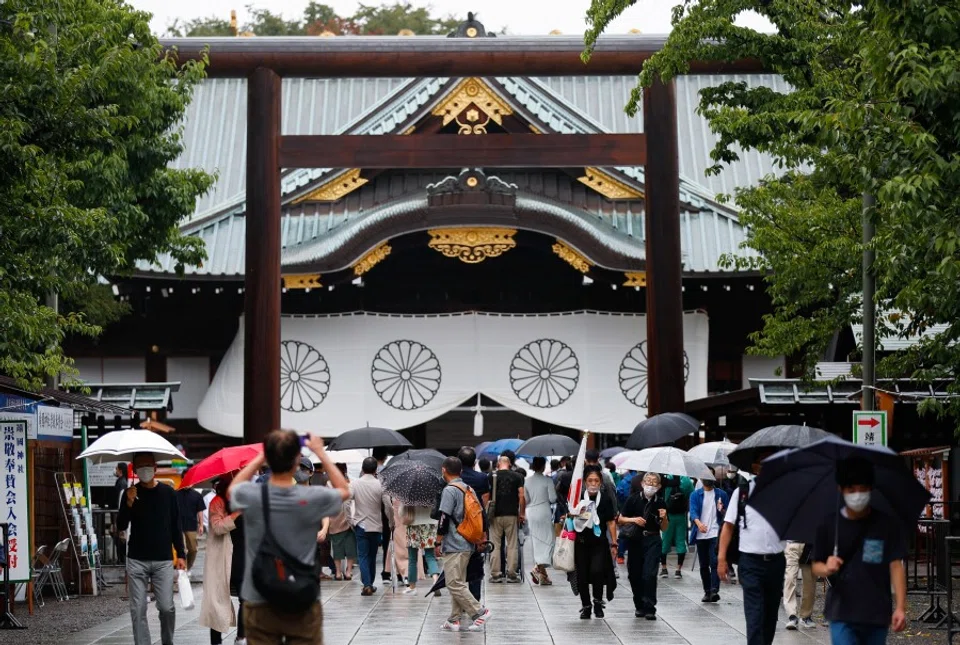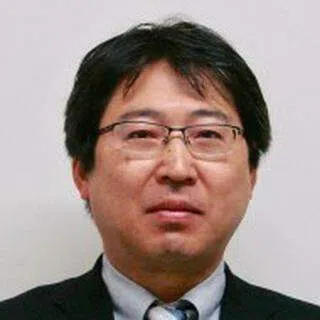Yasukuni Shrine visits: A mirror reflecting Sino-Japanese relations
Some Japanese politicians have the practice of marking the anniversary of the end of WWII for Japan by visiting the Yasukuni Shrine to pay tribute to the war dead. Even after more than 75 years, emotions run deep especially in China, which has registered its unhappiness at these visits. Japanese academic Shin Kawashima examines how Yasukuni Shrine visits can be used to gauge the state of Japan-China relations.

On 15 August 2021, which marks the anniversary of the end of World War II for Japan, a succession of Japanese cabinet members visited Yasukuni Shrine.
Visits to the shrine by cabinet members were curtailed by the former Abe administration after Prime Minister Shinzo Abe called for better relations with China. However, in 2020, the final year of the Abe administration, the policy of curtailment was relaxed and two cabinet members paid visits to the shrine.
Prime Minister Yoshihide Suga's administration inherited the policy of the Abe administration's final year. It did not curtail cabinet members' visits to Yasukuni.
The cabinet members who visited in August 2021 were Defence Minister Nobuo Kishi and Economic Revitalisation Minister Yasutoshi Nishimura on the 13th, and Environment Minister Shinjiro Koizumi, Education Minister Koichi Hagiuda, and Minister for World Expo 2025 Shinji Inoue on the 15th.
Prime Minister Suga himself sent a ritual cash offering, not as prime Minister but as president of the Liberal Democratic Party (LDP), at his personal expense. No public funds were used. Former Prime Minister Abe also visited the shrine.
The "Diet Members' Group for Visiting the Yasukuni Shrine", a supra-partisan group, refrained from visiting the shrine as a group because of the Covid-19 pandemic.

The Chinese government responded by issuing a statement on 15 August through a foreign ministry spokesperson, who remarked that "the Yasukuni Shrine, where 14 World War II Class-A war criminals with heinous crimes are honoured, is a spiritual tool and symbol of the Japanese militarism's war of aggression".
After emphasising the symbolism that China attaches to the Yasukuni Shrine, the spokesperson went on: "What some Japanese political figures have done on the issue of the Yasukuni Shrine affronts historical justice and seriously hurts the feelings of people in the victimised Asian countries, including China. It again reflects Japan's wrong attitude towards its own history of aggression."
It is interesting to note that the statement by the Chinese foreign ministry on 15 August criticised the words and actions of "political figures" as well as cabinet members' visits. It directed its criticisms not just at the "visits" but also the behaviour or words and actions of the visitors ("what they have done") .
This is a departure from the former standard stance of China, which took issue with the "prime minister, chief cabinet secretary and foreign minister's visit to Yasukuni Shrine". It also departs from China's recent stance, which took issue with cabinet members' visits. Thus, it seems that the current scope of criticism is wider.
When relations between China and Japan are good, the issue is often not seen as a problem, but when relations are deteriorating, criticism of Yasukuni visits often intensifies.
On the other hand, on 13 August a Chinese defence ministry spokesperson made an interesting comment. The position expressed on the Yasukuni Shrine issue and other issues is identical to that of the foreign ministry spokesman down to the last word, but while the foreign ministry spokesman did not name specific politicians, the defence ministry spokesperson effectively criticised Japanese Defence Minister Kishi or the "defence department" by name.
The defence ministry spokesman said: "In the recent period, the Japanese defence department has continuously taken negative actions on China-related issues. It smeared China's defence policy and military development with countries outside the region, conducted targeted military exercises, brutally intervened in the Taiwan question, which is purely China's domestic affairs, and carried out provocative actions in the South China Sea. All these moves have seriously disrupted the development of China-Japan defence relations."
This statement was not referring to the Yasukuni issue alone, but was rather a criticism of Japan's recent defence policy. "Countries outside the region" is considered to refer to the US and other countries which, together, are causing China "displeasure" over Taiwan and South China Sea issues.

On 19 August, it was reported that the foreign affairs and national defence divisions of the LDP were coordinating with the Democratic Progressive Party (DPP) of Taiwan to hold LDP and DPP "two-plus-two" talks on diplomacy and defence. A Chinese foreign ministry spokesperson strongly cautioned against this.
While no mention was made of the Yasukuni Shrine issue, the spokesperson said, "The Taiwan question concerns the political foundation of China-Japan relations. On the Taiwan question, the Japanese side bears historical responsibilities to the Chinese people for its past crimes and should especially be prudent with its words and actions." This indicates that China considers the Taiwan issue to be another historical issue with Japan.
The Yasukuni issue is also a mirror reflecting Sino-Japanese relations. When relations between China and Japan are good, the issue is often not seen as a problem, but when relations are deteriorating, criticism of Yasukuni visits often intensifies.
In 2021, not only were there several visits by cabinet members, but China broadened its criticism of the issue, from the visits themselves to the behaviour of those who visited. China also criticised the behaviours of Japan in respect of the Taiwan and South China Sea issues as historical issues, and put these together with the Yasukuni issue.
However, the Chinese foreign ministry still criticises only the defence department, refraining from criticising Japanese politicians by name. In this respect, it would seem that China has not changed its overall position since 2018 that Sino-Japanese relations are improving.
Related: Strong China-Japan relations a fantasy in a divisive world: Will ASEAN benefit? | Japanese academic: Biden's emphasis on allies is impacting Japan-China relations | Japanese academic: Has Japan 'crossed the Rubicon' in Japan-China relations? | China's 'new era' for China-Japan relations does not match Japan's needs | Shinzo Abe's first term: A princeling's attempt to rewrite World War II history



![[Photos] Fact versus fiction: The portrayal of WWII anti-Japanese martyrs in Taiwan](https://cassette.sphdigital.com.sg/image/thinkchina/3494f8bd481870f7c65b881fd21a3fd733f573f23232376e39c532a2c7593cbc)

